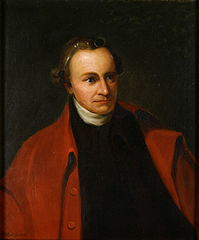Editorial
Give me liberty

Many of us rightfully associate the words “Give me liberty or give me death” with Patrick Henry’s famous speech. I encourage you to read the speech in its entirety here. Henry’s words are unforgettable. But we seem to have forgotten what drove him to say these words. I fear that Americans today have forgotten what life without liberty looks like and are consequently all too willing to surrender liberty for mediocre comforts – mediocre comforts that history has taught us will soon turn into chains.
Therefore, it is high time we do a little reminding – reminding the generation of the oblivious of the hardships of life under oppression. In a day and age when American history is scantily taught, it is no wonder that we have raised a generation that does not recognize the roots of despotism. While they may think the grass on the fields of socialism and communism look greener, in truth, the greener grass they are looking at is growing over a cesspool. Ronald Reagan once said:
How do you tell a communist? Well, it’s someone who reads Marx and Lenin. And how do you tell an anti-communist? It’s someone who understands Marx and Lenin.
Give me liberty or give me death. Why?
What was is that made our Founders prefer death over life without liberty? First we must understand that the American colonies lived primarily without interference from Great Britain since the colonization of Jamestown in 1607. Thirteen years later the Pilgrims arrived at Plymouth, Massachusetts, seeking religious freedom. Shortly thereafter, they were joined by the Puritans, who were also seeking religious freedom. It is fair to say that while some colonists, such as those at Jamestown, came to the New World out of ambition, most others came seeking freedom. It was the love of freedom that consequently colonized this nation and it was the love of freedom that founded its system of government.
Today all of that is about to be changed by those who prefer the comforts of a Nanny State to the American Dream, but are they counting the cost? Chances are they aren’t and chances are they don’t even understand what the American Dream is. Ronald Reagan described it best when he stated: “The American dream is not that every man must be level with every other man. The American dream is that every man must be free to become whatever God intends he should become.” What the Utopian Dreamers fail to realize is that the promise of Utopia is the greatest tool in the arsenal of despots. The irony is that the promise of life without stress and government-supplied comfort, is a life that divests its citizens of hope. In Reagan’s America, men and women are free to pursue happiness and become whatever they want and whatever God intends they should become. What our Utopian Dreamers fail to recognize is that a successful socialist state evolves into a communist state rather quickly. In a Nanny state, the government possesses all rights and they grant some back to the people – all under the pretense of taking care of them.
A Constitutional Republic

Patrick Henry. Oil on canvas, 29.5 inches (74.93 cm) x 24.625 inches (62.5475 cm). Cat. no. 31.00011.000. Artist: George Bagby Matthews (1857 – 1943), after Thomas Sully (1783-1872)
Fortunately for us, our Founders understood the repercussions of failed government systems. This led them to design a Constitutional Republic where the people possessed all rights and they granted some back to the government. However, they did not come by their understanding just through studying alone; they came to their understanding through direct experience. Once again, I encourage you to read Patrick Henry’s speech where he made that point very clear.
Our Founders also made it clear in our Declaration of Independence that they had exhausted all means of settling their disputes in a democratic manner. They also made it clear that they understood the differences between tyranny and liberty and believed it was their god-given duty to dispose of tyranny.
I will paraphrase some of the abuses our Founders listed in the Declaration of Independence, some of which are eerily similar to what we are experiencing today. I am doing so in hopes that it will help us to learn from our own history so that we are not doomed to repeat the suffering that will ensue and the cost that would have to be paid to reinstate liberty. And I am hoping it will open the eyes of our Utopian Dreamers to what a life without liberty really looks like.
Complaints against the King
The listed complaints that are relevant for us are as follows (Note: this is not a comprehensive list):
- The King refused to obey the laws that were necessary for the general welfare of the people. It was his way of using our modern day Executive Orders and claiming Executive Privilege.
- The King obstructed the legislature from passing laws that the people needed and required (like a balanced budget, or a controlled debt ceiling).
- The King refused to pass other laws necessary to the people unless he could strike a deal that suppressed their representation.
- The King called meetings of legislators together in secrecy – far from the public eye.
- The King dissolved representation of the people on a regular basis and repeatedly assaulted the rights of the people.
- He limited the powers of legislators.
- He usurped the laws of nationalization. In the case of the King, he usurped these laws in order to restrict the population growth of the Colonies. Today our naturalization laws are being usurped to grow the powerbases of groveling candidates.
- He obstructed the administration of justice.
- He influenced the judges.
- He created a multitude of new offices, which he used to harass the people and impact their prosperity.
- He ignored the consent of the legislature regarding standing armies.
- He made the military independent of civil power.
- He subjugated the autonomy to the jurisdiction of foreigners.
- He imposed taxes on the Colonists without their consent.
- He fundamentally altered the forms of government (Change you can believe in?).
- He overrode the legislature and ceased their power.
- He waged war against his own people.
- He turned Colonist against Colonist.
- He ignored every petition made by the people and replied with more abuse.
While the list above is substantial, it does not comprehensively tell the entire story of bondage that the Colonists endured. The first ten amendments to our Constitution, commonly referred to as our Bill of Rights, give us more insight into what our Founders valued to the point of death. These amendments are properly labeled our “Bill of Rights” because they are indeed a list of rights that our Founders believed to be so important that they had to be spelled out in no uncertain terms. And – there were reasons they came to this conclusion. They knew what it was like to live in a land were these rights were constantly under assault and they wanted to protect our country from enduring these assaults in the future.
The Bill of Rights
Once again, I will paraphrase what was written, but I will also add why it was written.
- The First Amendment – written to protect our right to worship as we please, to speak as we please, and to assemble and petition our government as we believe necessary. It also protects the right of the press, which they believed was an essential watchdog over tyrannically disposed humans. This Amendment was written in response to their direct experience of oppression in all these categories. Life without liberty and the protection of our constitution would not contain these rights. Think about living in a land where you are told what you must believe; what you can and cannot say; that you cannot complain to your government about any abuses – whether by petition or assembling with others; and where you have no idea about what is happening in government because the press has become an arm of the government.
- The Second Amendment – The right of the people to keep and bear arms. The first battle of the American Revolution was fought at Breed’s Hill, commonly referred to at the Battle of Bunker Hill. The objective of the British troops in this battle was to confiscate the firearms of the Colonists. Our Founders understood the necessity of the right of the people to bear arms – not just for sport or to hunt, but to fend off the abuses of a government that has grown too big for its britches. At the end of WWII, the Japanese said that they didn’t invade our homeland because we had guns. Think about that a bit.
- The Third Amendment – protects our privacy from government intrusion. The Colonists didn’t have the internet or other modern day conveniences. The British government invaded their privacy by forcibly lodging troops in their homes. Think about how you would feel if hostile government troops were living in your home, with your family, and at your expense.
- The Fourth Amendment – Our right not to be searched without due process. Think about living in a land where any government official could enter your home at any time without any reason and tear it apart. Our Founders didn’t have to think about what this would be like; they experienced it firsthand.
- The Fifth Amendment – you can’t be tried without just cause and without first being indicted or without due process. And, your personal property cannot be confiscated without compensation. Once again, our Founders knew what it was like for the government to confiscate their property on a whim. Today we are dangerously close to repeating this with the perversion of our Eminent Domain Laws and The Patriot Act.
- The Sixth Amendment – You have the right to a speedy trial with a jury of your peers. The antithesis of this is being arrested and not given a trial and judgment passed upon you by some government lackey. A jurist system without this caveat would make a Kangaroo Court look civil.
- The Seventh Amendment – Civil suits also must go through due process. This protects every citizen from being railroaded and deprived of justice.
- The Eighth Amendment – Excessive bails shall not be set, nor excessive fines required, nor cruel or unusual punishment imposed. Think about being pulled over for a minor traffic violation and finding yourself locked up for the rest of your life without the hope of bail. Again, our Founders experienced the antithesis of this.
- The Ninth Amendment – Our insurance against arguing that the only rights we have are the ones listed in the Constitution.
- The Tenth Amendment – The states retain all powers that do not conflict with the powers of the Federal government listed in the Constitution. This was written to keep government accountable at the local level and to ensure the autonomy of the individual states.
There you have it: between the complaints listed in the Declaration of Independence and our rights protected in our Bill of Rights, you should have a good idea of what life without our Constitutional Republic might devolve into. It is these very rights that men were willing to die for and it is these same rights that so many are willing to abandon for things like $9/month birth control. If you think that peace is so sweet or life is so dear that it is worth the price of chains and slavery, well then you won’t value liberty and you won’t deserve it either. As for me, give me liberty.
[subscribe2]
RoseAnn Salanitri is a published author and Acquisition Editor for the New Jersey Family Policy Council. She is a community activist who has founded the Sussex County Tea Party in her home state and launched a recall movement against Senator Robert Menendez. RoseAnn is also the founder of Veritas Christian Academy, as well as co-founder of Creation Science Alive, and a national creation science speaker.
-

 Civilization3 days ago
Civilization3 days agoWhy Europe Shouldn’t Be Upset at Trump’s Venezuelan Actions
-

 Executive4 days ago
Executive4 days agoHow Relaxed COVID-Era Rules Fueled Minnesota’s Biggest Scam
-

 Constitution5 days ago
Constitution5 days agoTrump, Canada, and the Constitutional Problem Beneath the Bridge
-

 Christianity Today3 days ago
Christianity Today3 days agoSurprising Revival: Gen Z Men & Highly Educated Lead Return to Religion
-

 Civilization4 days ago
Civilization4 days agoThe End of Purple States and Competitive Districts
-

 Executive3 days ago
Executive3 days agoWaste of the Day: Can You Hear Me Now?
-

 Executive4 days ago
Executive4 days agoWaste of the Day: States Spent Welfare in “Crazy Ways”
-

 Guest Columns5 days ago
Guest Columns5 days agoWhy We Need Lent












Digg Patriots liked this on Facebook.
Theresa Brooks liked this on Facebook.
David Sullivan liked this on Facebook.
Michael Alan Kline Sr liked this on Facebook.
Jeremiah Laments liked this on Facebook.
PolitiCollision liked this on Facebook.